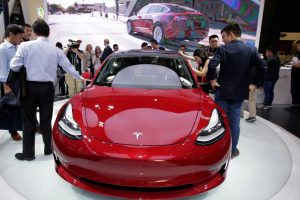Key Points
- 🇺🇸 The White House issued updated guidance on federal EV tax credits, with a key exemption for automakers.
- 🚗 The exemption provides extra time for companies setting up battery production in the U.S. to transition to domestic minerals.
- 💼 Stricter rules aim to reduce dependence on China and other foreign sources for battery minerals.
- 🌐 Temporary exemption until 2025 for critical battery materials from “Foreign Entities of Concern” (FEOC).
- 📅 FEOC rules effective in 2024 for completed batteries, with limitations on trace critical minerals starting in 2025.
- 🌏 Countries deemed FEOC include North Korea, China, Russia, and Iran.
- 🚙 New rules expected to limit eligible EVs for tax credits, disqualifying vehicles not assembled in the U.S.
- 🏭 General Motors (GM) believes it can maintain consumer incentives for many EVs beyond 2024 due to U.S. investments.
- 💸 Updated tax credit rules allow instant access to rebates for EV buyers, departing from the previous tax season wait.
The White House issued new guidance on federal electric vehicle (EV) tax credits this week, including a key exemption that’s considered a win for many automakers, as it offers extra time for companies attempting to set up battery production operations in the U.S. to switch to domestic minerals.
The U.S. Treasury announced the new tax credit guidance on Friday, and General Motors and some other automotive groups have since responded to the news (via Reuters). Notably, the guidance includes a slight reprieve from stricter rules around battery mineral sourcing after the Biden administration has been considering plans to introduce the changes in the past several days.
Although the updated guidance is stricter overall and is meant to help wean the U.S. battery supply chain off of China and other sources, it also includes a temporary exemption to the rules that would block incentives for vehicles utilizing critical battery materials from China and other countries that are considered “Foreign Entities of Concern” (FEOC).
Under the guidance, the FEOC rules will take effect in 2024 for completed batteries, while the limitation won’t apply to the trace critical minerals used in the batteries until 2025. According to the U.S. Treasury, the minerals exempted represent under 2 percent of the value of critical battery minerals.
The Energy Department said that companies would be deemed FEOC if they were owned or controlled by a named foreign government, adding that they’ll be considered ineligible if an entity of concern holds 25 percent or more of the entity’s board seats, equity or voting rights. These countries include North Korea, China, Russia and Iran.
The Alliance for Automotive Innovation, a group representing most automakers in the U.S., called the decision to exempt trace materials for the next two years “significant and well-advised,” noting that several more vehicles would have been made ineligible under the originally proposed rules.
The new rules are expected to significantly limit the number of EVs that are eligible for the credit, and it also immediately disqualified any vehicles that weren’t assembled in the U.S.
Ford has been awaiting the new guidance to determine whether an upcoming battery plant project in Michigan with Chinese battery maker CATL would allow produced vehicles to be eligible. Neither the Biden administration nor Ford has commented on the new guidance at the time of writing, so it isn’t yet clear if the Michigan plant’s EVs will be eligible for the tax credits.
GM responded to the updated guidance on Friday, as detailed in a separate report from Reuters.
“Due to GM’s historic investments in the U.S and efforts to build more secure and resilient supply chains we believe GM is well positioned to maintain the consumer purchase incentive for many of our EVs in 2024 and beyond,” the automaker said following the release of the updated guidance.
Crucially, the updated tax credit rules will also let EV buyers gain instant access to their rebates, rather than the current model in which consumers must wait until tax season.





